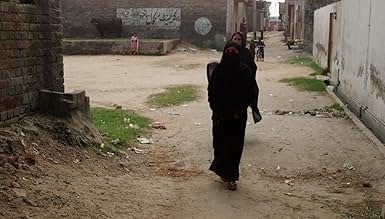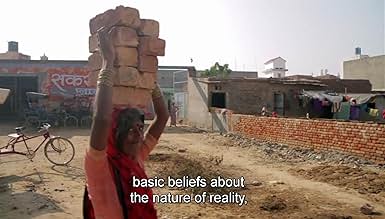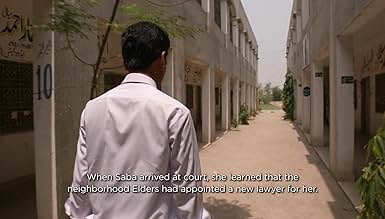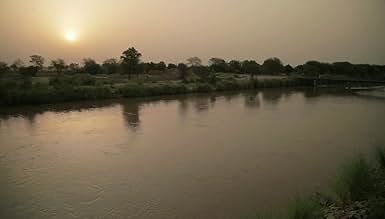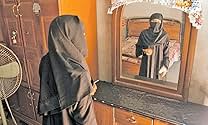VALUTAZIONE IMDb
7,8/10
2027
LA TUA VALUTAZIONE
Aggiungi una trama nella tua linguaA woman in Pakistan sentenced to death for falling in love becomes a rare survivor of the country's harsh judicial system.A woman in Pakistan sentenced to death for falling in love becomes a rare survivor of the country's harsh judicial system.A woman in Pakistan sentenced to death for falling in love becomes a rare survivor of the country's harsh judicial system.
- Regia
- Star
- Vincitore di 1 Oscar
- 3 vittorie e 2 candidature totali
Recensioni in evidenza
A GIRL IN THE RIVER
THE PRICE OF FORGIVENESS
Sharmeen Obaid-Chinoy born in November 12, 1978) is a Canadian-Pakistani journalist, filmmaker and polbornitical activist known for her work in films that highlight gender inequality against women. Sharmeen Obaid-Chinoy won the Oscar for Short Documentary in 2012 for Saving Face. She's nominated again this year for A Girl in the River: The Price of Forgiveness. Both films tell the stories of Pakistani women mutilated or killed by radical moralists, and highlight the people around them fighting for societal progress.
It's a cliché to say that cinema has the power to change the world, but the reason it's become such a well-worn phrase is because films like Sharmeen Obaid-Chinoy's A Girl in the River: The Price of Forgiveness exist to make it happen and influence lawmakers at the highest level.
The filmmaker won her second Academy Award in the 'Best Documentary Short' category for the 40 Minute profile piece that premiered on HBO, and it ended up instigating similar change to her first winner, Saving Face, a haunting story centred on acid attacks made against women in Pakistan.
A Girl in the River follows Saba, a Year-old who survives an honour killing attempt made by her father and uncle after she defied their express wishes to elope with her husband. She was shot in the head, placed in a sack, and then dumped in the river, but miraculously managed to escape her near-fatal predicament and make her way to a local hospital, beginning a fight for justice that faced an uphill struggle to alter the traditional way of thinking in local society.
As Obaid-Chinoy explained to the International Documentary Association, her second Oscar-winning documentary reached all the way to the corridors of power, with the Pakistani prime minister vowing to make changes to the nation's existing legislation as it pertained to honour killings, driven largely by the impact of A Girl in the River.
Review written by artist jayakumar jrain.
Sharmeen Obaid-Chinoy born in November 12, 1978) is a Canadian-Pakistani journalist, filmmaker and polbornitical activist known for her work in films that highlight gender inequality against women. Sharmeen Obaid-Chinoy won the Oscar for Short Documentary in 2012 for Saving Face. She's nominated again this year for A Girl in the River: The Price of Forgiveness. Both films tell the stories of Pakistani women mutilated or killed by radical moralists, and highlight the people around them fighting for societal progress.
It's a cliché to say that cinema has the power to change the world, but the reason it's become such a well-worn phrase is because films like Sharmeen Obaid-Chinoy's A Girl in the River: The Price of Forgiveness exist to make it happen and influence lawmakers at the highest level.
The filmmaker won her second Academy Award in the 'Best Documentary Short' category for the 40 Minute profile piece that premiered on HBO, and it ended up instigating similar change to her first winner, Saving Face, a haunting story centred on acid attacks made against women in Pakistan.
A Girl in the River follows Saba, a Year-old who survives an honour killing attempt made by her father and uncle after she defied their express wishes to elope with her husband. She was shot in the head, placed in a sack, and then dumped in the river, but miraculously managed to escape her near-fatal predicament and make her way to a local hospital, beginning a fight for justice that faced an uphill struggle to alter the traditional way of thinking in local society.
As Obaid-Chinoy explained to the International Documentary Association, her second Oscar-winning documentary reached all the way to the corridors of power, with the Pakistani prime minister vowing to make changes to the nation's existing legislation as it pertained to honour killings, driven largely by the impact of A Girl in the River.
Review written by artist jayakumar jrain.
Sharmeen Obaid-Chinoy won an Oscar for her documentary "Saving Face", about victims of acid attacks. Her documentary "A Girl in the River: The Price of Forgiveness" looks at so-called honor killings (the murder of a family member who is perceived to have brought shame upon the family). In this case, a girl hooked up with a man of whom her family disapproved, so they tried to kill her but she survived and filed charges against her attackers. The question then becomes whether or not she can forgive her attackers.
I don't know how long honor killings have been going on. I suspect that every fundamentalist from every religion would do this sort of thing if given the chance. Whatever the case, it's an outstanding documentary drawing attention to a too often ignored problem. It deserved its Oscar win, and I hope that Obaid-Chinoy continues making these sorts of documentaries.
I don't know how long honor killings have been going on. I suspect that every fundamentalist from every religion would do this sort of thing if given the chance. Whatever the case, it's an outstanding documentary drawing attention to a too often ignored problem. It deserved its Oscar win, and I hope that Obaid-Chinoy continues making these sorts of documentaries.
If you like true stories told very well, but briefly, and you'd like to get a leg up in an Oscar pool, then this review is for you! In my continuing effort to see as many Oscar nominees as possible, I took advantage of the opportunity to see the shorts.TV theatrical presentation "Oscar Nominated Short Films 2016: Documentary" (NR, 3:00 – with 10 min. intermission). Here's a brief, spoiler-free summary and evaluation of one of those five films...
"A Girl in the River: The Price of Forgiveness" (40 min.) – Saba was an 18-year-old Pakistani girl who fell in love with and married a young man of whom her family did not approve. For this "crime", her father and uncle kidnapped her from the home of her new husband's family, drove her to a riverbank, shot her in the head, placed her in a sack and threw her in the river. Saba was one of over 1,000 women targeted for "honor killings" every year in Pakistan, but unlike most of those nameless victims, Saba survived. We see her in the hospital being treated for her wounds, then we follow her as she returns to live with her husband and his family and is pressured to drop the charges against her uncle and father and publicly "forgive" them. All the key players in this real-life drama give interviews in which they tell us about their roles in this story and openly discuss their points of view. We even get to sit in on a meeting between local tribal elders and Saba's lawyer, trying to find a resolution to the case. With remarkable access, a flare for story-telling and the ability to present all points of view without judgment, Sharmeen Obaid-Chinoy has directed an important and outstanding film which rises above the label of "documentary short" and demands to be seen by everyone who cares about our common humanity. "A+"
The other four films in the shorts.TV theatrical presentation "Oscar Nominated Short Films 2016: Documentary" are "Body Team 12" "Chau, beyond the Lines" "Claude Lanzmann: Spectres of the Shoah" "Last Day of Freedom"
"A Girl in the River: The Price of Forgiveness" (40 min.) – Saba was an 18-year-old Pakistani girl who fell in love with and married a young man of whom her family did not approve. For this "crime", her father and uncle kidnapped her from the home of her new husband's family, drove her to a riverbank, shot her in the head, placed her in a sack and threw her in the river. Saba was one of over 1,000 women targeted for "honor killings" every year in Pakistan, but unlike most of those nameless victims, Saba survived. We see her in the hospital being treated for her wounds, then we follow her as she returns to live with her husband and his family and is pressured to drop the charges against her uncle and father and publicly "forgive" them. All the key players in this real-life drama give interviews in which they tell us about their roles in this story and openly discuss their points of view. We even get to sit in on a meeting between local tribal elders and Saba's lawyer, trying to find a resolution to the case. With remarkable access, a flare for story-telling and the ability to present all points of view without judgment, Sharmeen Obaid-Chinoy has directed an important and outstanding film which rises above the label of "documentary short" and demands to be seen by everyone who cares about our common humanity. "A+"
The other four films in the shorts.TV theatrical presentation "Oscar Nominated Short Films 2016: Documentary" are "Body Team 12" "Chau, beyond the Lines" "Claude Lanzmann: Spectres of the Shoah" "Last Day of Freedom"
The Girl in the River - for me - is a film about the miracle, first and foremost. Because not everybody who can survive after gunshot in the face, and bag over head, and drowning. The young woman survived. And yet. The film shows forgiveness under pressure from the surrounding society. Not natural forgiveness. The troubled society shown in the film was simply trying to find balance. That's all. That's why the girl was pressured to forgive her father. Nothing changed inside the people. The situation didn't teach them anything. But I hope this film will teach us something. After watching the film, I looked for information about what happened to Saba and her husband 10 years after the filming of the film. I want to believe that they are doing well.
This film is set in Pakistan and is about so-called 'honor killings'--when families murder their own daughters in order to save face with their neighbors. The particular subject of this film is a young lady named Saba. Saba married a man despite her family not giving her permission and her father and uncle dealt with it by shooting her and dumping her into the river. However, Saba's case is unusual because she actually survived the gunshot to her face and the film follows the case through the Pakistani court and to its ultimate resolution...or lack of resolution. The film is hellaciously depressing but fortunately the gunshot wound isn't as horrible to see post-surgically as you might imagine and Saba is rather inspiring because of her inner strength. It's also an amazing film because everyone talks so openly about what occurred and the father seems incredibly proud of his actions and by the end of the film he is elated that he maintained his sense of honor by trying to murder his daughter.
By the way, if you are curious, the filmmakers and folks they interviewed were careful to reiterate that these honor killings are not in any way approved of in the Koran but are more cultural than religious in nature.
UPDATE: This film did take the Oscar for Best Documentary Short.
By the way, if you are curious, the filmmakers and folks they interviewed were careful to reiterate that these honor killings are not in any way approved of in the Koran but are more cultural than religious in nature.
UPDATE: This film did take the Oscar for Best Documentary Short.
Lo sapevi?
- QuizAt the end of her acceptance speech, during the exit music, director Sharmeen Obaid-Chinoy announced that after viewing this film, the Prime Minister of Pakistan will change the law on honor killing.
- ConnessioniFeatured in The Oscar Nominated Short Films 2016: Documentary (2016)
I più visti
Accedi per valutare e creare un elenco di titoli salvati per ottenere consigli personalizzati
Dettagli
- Data di uscita
- Paesi di origine
- Lingua
- Celebre anche come
- En kvinna i floden: Priset som du får betala för att förlåta
- Aziende produttrici
- Vedi altri crediti dell’azienda su IMDbPro
- Tempo di esecuzione
- 40min
- Colore
Contribuisci a questa pagina
Suggerisci una modifica o aggiungi i contenuti mancanti


